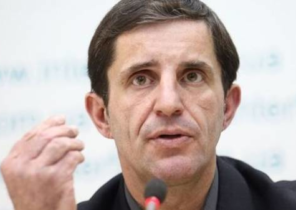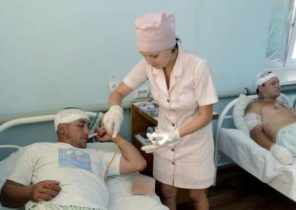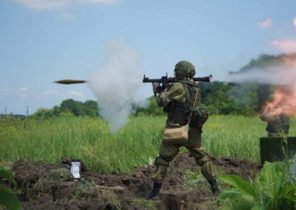
According to a young man from Saaremaa, compulsory study of Russian language is necessary
The lesson of the Russian language are the subject of “food.” The teacher from the 11th grade of the school of Saaremaa scores of the students questions.
“What kind of soup you like, March?”, asks in Russian teacher Love Paju (Paju Ljubov).
“Hodgepodge Hodgepodge…”, — March tombstone (Mart Truu) tries to put a word in the proper case.
In this school Russian language is a compulsory subject since the sixth grade. School independently made the decision to make this mandatory, although on the island of Saaremaa practically no Russian.
Tombstone hears the Russian language mainly in the classroom and sometimes at home, when his father, who served in the Soviet army, watching on TV Russian Comedy. Russian friends had not.
“With the Russian language compulsory, the situation is the same as with the mandatory literature classes. Everything necessarily becomes unpleasant. But, in fact, Russian language is necessary,” he muses.
30% of the population considers Russian as their native language and speak it.
“Whether we like it or not, there are families who for several generations do not learn Estonian,” says tombstone.
A large minority have their homes, kindergartens, schools and workplaces. The most popular Hobbies of the Russian-speaking population are different kinds of martial arts and hockey, and the Estonians love basketball and singing. If you add to it the Russian and Estonian television, it becomes clear that the path does not intersect.
“They came to us they were, but in their native language we speak. It is a bare fact. It is possible to resist, but you can live with that,” says tombstone.
Therefore, tombstone decided to accept and to learn the Russian language. In Tallinn the Russian language is often a condition of employment.
Now in Estonia I remember the excitement of the Russian-speaking population associated with the transfer of the monument, which broke out ten years ago in Tallinn. Then Martha tombstone was seven years old, and he remembers little about what happened. Left with the impression that the Russians can be out of temper.
Tombstone recently met in the Russian theatre festival in Narva. All issues decided on English.
“The young are more inclined to cooperation”, — said tombstone.
The usual Estonian day of March, tombstone starts at 7:30 toast and coffee in the house, the hall which is filled with the smell of apples. All his ancestors are from Saaremaa.
“We appreciate our roots,” says tombstone, spreading butter on bread.
Hurrying to work, the mother-a nurse brings from the mailbox of the local newspaper “Meie Maa” (“Our country”). The world of tombstone watching the new news portal Delfi and sometimes on the BBC. A lot of news is on Facebook.
The eldest brother goes in a medical examination in connection with the conscription. March tombstone straightens his tie, rubs the shoes and takes from the shed in the yard of the Bicycle.
The first lesson today philosophy. Tombstone welcomes his classmates Estonian cautious nod.
In the second half of the day tombstone runs home. On the wall in his room hangs a lot of letters for achievements in music and theatre and a whole bunch of medals for winning basketball. However, he dreams of a profession related to computer technology. In this area it would be possible to earn and in Estonia.
The main problem of Estonia, according to tombstone, is emigration.
“It would be important to create such conditions that the Estonians do not have the desire or the need to leave the country for economic reasons”.
Night tombstone in a hurry to choir practice in school.
“Song festivals have a better understanding of the Estonian spirit. They have a sense of belonging. The feeling that together we can do anything.”
The guy from Narva speaks English better than Estonian
Vladislav Konstantinov from Narva to support the idea of the European Union and wants to study in any other EU country.
The lesson of the Estonian language discuss the topic of phones with touch screens, but first, the 17-year-old Vladislav Konstantinov give you the opportunity to talk about the trip to Strasbourg.
Konstantinov, who is studying in 11th grade school Narva Kesklinna Gümnaasium, last night returned from France. A group of students represented Estonia at the EU event.
— What is the most memorable?— asks someone.
— The old town. There are more homes and they are prettier than in Tallinn.
The majority of Russian-speaking high school students have a good command of the Estonian language. In accordance with the Estonian legislation, in a similar Russian-language schools at least 60% of teaching hours should be held in Estonian.
Paragraph 14 of the textbook “Winning streak touchscreen displays” requires good knowledge of the language, and the topic is interesting 17-year-old. For two hours a day.
The answers students hear that they do not speak Estonian at home.
“Estonian I speak mostly at school, so my English is better. My Estonian friends, or bilingual, or speak Russian.”
We came to the apartment to Konstantinov, which is located on the top floor of a four Stalinist house on the street Youlocate, about eight o’clock in the morning.
Mother working in the power company, and the father working as a locomotive driver, had already left for work. Konstantinov drinking tea and eating cheesecake, porridge today do not. In addition, the mother baked a cake with cocoa.
The house is quiet because the TV is not included. Konstantinov did not watch TV. The news he reads on the Russian-language pages of the BBC on your smartphone. For the Estonian media, he is responsible for the Estonian and Russian languages, in the case in Estonia, something important happens.
“But I can’t stand these Estonian news, which in all seriousness write about the cat removed from the tree.”
Family history Konstantinov typical for inhabitants of Narva. Grandpa and grandma came here in Soviet times, parents were born in Narva. Konstantinov, his parents and grandmother Estonian passport, my grandfather is Russian.
“He did not receive Estonian citizenship, so I took Russian. It’s better to be a citizen of some country than a person without citizenship,” — says Konstantinov on the way to school.
The path runs along the street Pushkin in the city centre. On the right is Russia.
Konstantinov said that there a couple of times a year. His cousins and sisters live in Saint-Petersburg.
The first lesson is history and social studies. At the door of the class, the guys shake hands.
The schedule also is the native language, biology and Estonian.
Konstantinov enjoys singing, playing the guitar, included in the youth Council and plays in the theater. Together with friends they organized a small start-up project. He reads a lot, including poems by Russian poets such as Mayakovsky.
His main hobby is debate. After school need to prepare for state competition debate, which will be held at the end of the week.
Although the competition is held separately on the Estonian and Russian languages, it is held in one place where both groups meet. In ordinary life, they communicate little. The social network is also different: among the young people of Narva Russian-language Vkontakte is more popular than Facebook.
Konstantinov still see their future in Estonia. It does not feel like a second class citizen. Bronze soldier is only the story which he hears from the news.
It supports the idea of the EU and wants to study abroad, but will return to work in Estonia.
“I do not consider myself neither Estonian nor Russian nor Estonian Russian. I consider myself a European.”







